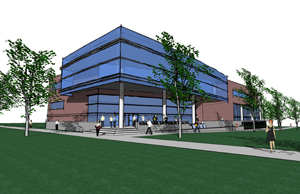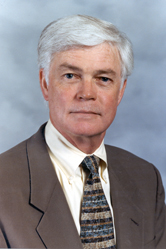 |
An artist’s rendering of the planned College of Public Health Building, which UNMC officials hope will be built on 40th street. Today, officials will announce that the college, the first new college at UNMC since 1968, is officially up and running. |
“We have been working extremely hard to make this happen,” said Jay Noren, M.D., dean of the College of Public Health. “We now have the only public health college in Nebraska and the only one in a large north central section of the country, spanning 1,400 miles east-west and 800 miles north-south. This is truly a landmark event for our state to celebrate.”
|
|
Dr. Noren said public health education, research and practice have become critical issues to ensure a healthy future in the U.S., particularly given the national concerns about pandemic disease, childhood obesity, health care costs, improved methods for prevention of major chronic diseases (Alzheimer’s/dementia, heart disease, cancer and stroke), environmental health risks, bioterrorism preparedness and health disparities.
“UNMC is well positioned to be an important regional and national player through the growth of the new College of Public Health,” said Harold M. Maurer, M.D., UNMC chancellor. “The college will enhance access to additional federal and state resources and programs that are typically only available to colleges of public health. It is a very important addition that gives UNMC all the assets it needs to achieve its goal of becoming a world-class academic medical center.”
As the College of Public Health has become operational, Dr. Noren said several key developments have taken place or will occur in the near future. These include:
- Bringing together all faculty, staff, programs, space and budgets of the UNMC Department of Preventive and Societal Medicine, the Rural Health Education Network, the Health Professions Tracking Center, Center for Health Services Research (including Centers for Rural Health Research and Rural Health Policy Analysis), Center for Health Disparities, and the UNMC components of the Center for Biosecurity and Center for Biopreparedness Education into the College of Public Health.
- The joint Master of Public Health Program involving UNMC and the University of Nebraska at Omaha will transfer to the new college and continue as a joint effort of the two campuses.
- UNMC will assign initial space for the college in newly acquired facilities in the campus area.
- Within the next few years the college will be housed in a new building, which is the top priority on UNMC’s facilities expansion plan.
- New, expanded relationships are emerging with the joint Environmental Toxicology Center involving UNMC and the University of Nebraska-Lincoln.
- Additional partnerships are developing with UNO faculty in public administration, sociology, gerontology, social work, health education and other elements of the School of Health, Physical Education, and Recreation.
- Enhanced partnerships with the Nebraska Health and Human Services System (HHSS).
Dr. Noren said the college hopes to recruit 10 new faculty in the next two years and 20 new faculty in the next four years.
 |
Jay Noren, M.D. |
In addition, Dr. Noren said an external advisory council has been established by the College of Public Health. The External Advisory Council presently includes 30 people from around the state — many with public health expertise. Being connected to individuals and organizations around the state is the norm for colleges of public health, Dr. Noren said.
“Public health is very much a multidisciplinary endeavor. It’s vital that we establish strong ties in the state with experts in many different areas, including medicine, dentistry, nursing, pharmacy, all allied health areas, public administration, education, government, behavioral sciences, political science, social work, law and communications,” he said. “We also will be dealing extensively with colleagues in health and human services and education institutions throughout the community.”
“Nebraska, along with the rest of the nation, is experiencing a public health workforce shortage,” said Joann Schaefer, M.D., chief medical officer for the Nebraska Health and Human Services System. “One of the most difficult challenges facing our state today is ensuring there are enough people to respond to public health threats. The UNMC College of Public Health will bring much-needed people into our public health pipeline.”
Dr. Noren said three new doctoral programs are planned — health services research/health administration, health promotion and disease prevention researc, and environmental health sciences — and the college plans to implement these programs by the fall 2008 semester.
In addition, the College of Public Health plans to provide several expanded areas of specialization in the existing master of public health program with UNO. These expanded areas include biostatistics/epidemiology, health promotion/ disease prevention and environmental health, which will be additions to the existing specializations in community health education and public health administration.
“This is an exciting day for the entire university system. This new college will be paying ongoing dividends to our city, our state, the region and the nation,” said John Christensen, Ph.D., interim UNO chancellor. “Public health practice is important to all us. The work and research in the college will contribute to overall better health and to the potential reduction in costs for critical care.”
Dr. Christensen added that the UNO-UNMC relationship on public health policy development, thanks to work already being done in the masters of public health program, will only be strengthened as the new college grows. Collaboration naturally leads to innovation when different academic professionals concentrate on an issue, he said.
Dr. Maurer noted the potential economic impact of the college. Among the current 38 colleges of public health nationally, the average external grant funding is $38 million. As the new UNMC College of Public Health develops, its external grant funding will increase and could result in as much as $30 million in new funds resulting in a $67.5 million boon to the state’s economy, which equates to about 700 to 750 new jobs.
UNMC’s planned investment in establishing the College of Public Health is estimated at approximately $12 million in the first five years. These expenses will be met by reallocating nearly $3.5 million in existing resources from several UNMC departments, infusing more than $5 million in state and university funds and bringing in more than $3.5 million in extramural grants, contracts and gifts.
The College of Public Health is initially being housed in existing campus facilities where current faculty work. Rubens Pamies, M.D., vice chancellor for academic affairs and dean of graduate studies, said UNMC hopes to eventually consolidate all the college’s activities into a new facility that would be located on 40th Street, just to the south of the UNMC Eye Clinic on Dewey Avenue.
What others are saying about the College of Public Health
“The inception of the College of Public Health will facilitate all three key components of the College of Medicine — education, patient care and research, especially clinical research. As the college grows and its scope evolves, it will enhance our mission in more ways than we can possibly conceive. I support this new and exciting adventure with tremendous enthusiasm.”
John Gollan, M.D., Ph.D., dean, UNMC College of Medicine
“With the passage of LB 692 in 2001, a new era of public health in Nebraska was born. Over a relatively short period of time, the state went from 16 health districts covering 22 counties, to 18 districts covering all 93 counties. For those counties to assume these very important responsibilities, the state anticipated they would require a trained workforce. That work force was limited at the time, and while much learning and training have been done, the College of Public Health will formalize that education and the workforce will be even better trained, and therefore provide even better public health services to protect the health of Nebraskans and those visiting or passing through our great state.”
Richard Raymond, M.D., under secretary for food and safety, U.S. Department of Agriculture
“At Union Pacific, we’re vitally interested in improving the health of our employees and their families and in ensuring that they make good decisions in obtaining health care. Because Omaha is our headquarters, we are excited to have the ability to have top notch researchers and health care professionals right here for us to work with on health issues. We especially want to address how to encourage UP employees and families to adopt healthy lifestyle habits by eating right, getting enough exercise and not smoking. And, when our folks need health care services, we want them to be good consumers by making decisions based on quality and cost. The new College of Public Health will address all of these issues. UNMC is to be congratulated in developing this new College and tackling this critical work.”
Barb Schaefer, senior vice president, Union Pacific Corporation
“I’m thrilled that the College of Public Health is coming to Nebraska. I’m presently enrolled in the master’s program in public health through UNO and UNMC and I plan to seek my doctoral degree in public health. Now, I won’t have to uproot my family and move to Iowa or Oklahoma to pursue my doctorate. I can stay home, continue my education and allow my children to continue their education here in Nebraska.”
Myles Jones, teacher/adviser, Omaha Central High School, and master’s level student in public health
“I am very excited about the establishment of the College of Public Health in our state. I am most excited about the Center for Health Services Research, which includes the Center for Rural Health Policy Analysis and the Center for Rural Health Research, moving into the College of Public Health. This center has been a credible voice for rural health providers to address policy makers in Washington for many years. I believe that having this center affiliated with the College of Public Health will only strengthen this voice and expand their areas of research.”
Marty Fattig, CEO, Nemaha County Hospital, Auburn
“Over the past five years, Nebraska’s public health system has expanded from coverage of 18 counties to coverage of all 93 counties. As our public health infrastructure continues to grow, the opening of the College of Public Health will be a critical factor as we address emerging public health threats. We look forward to continuing our partnership with UNMC on this very vital endeavor.”
Rita Parris, executive director, Public Health Association of Nebraska
“UNMC will distinguish itself with the work of this new College of Public Health. We can serve as a resource for our own communities statewide as well as a large portion of the midwestern and western United States. This work, done with effective collaborations, can develop and implement efficient delivery systems for quality health care and prevention for all citizens.”
Lyn Wallin Ziegenbein, executive director, Peter Kiewit Foundation